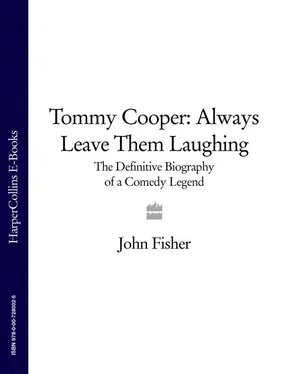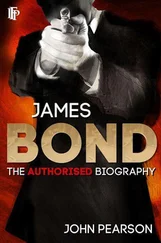Once seen he would never be forgotten, but what you remember, of course, is the broad image of an ungainly hulk in a red hat. Analyse his performance and he is seen to represent a far more complex range of expression and body language than the immediate impact of his branding suggests. Facially he is as interesting as Keaton, the stone face comic of the silent screen who supposedly never smiled but in whose countenance one can read all of human emotion. The legendary guru of British comedy, Spike Milligan once described the Cooper visage to me as ‘a call for help, wasn’t it? “Please help me out of this. Please. Please.”’ His deep-set, almost mournful wide blue eyes were perfect for registering a resigned astonishment at life’s ups and downs. In time the perplexed Cooper look, characterized by a glance upwards and through forty-five degrees and as such betraying his theatrical roots, would become as much a part of his comic persona as Jack Benny’s stare. No one had a more beseeching glance of puzzlement as he scrutinized a prop that was new to him, observed a more manic look of desperation when a trick failed, a guiltier look of complicity – like that of a child with his hand stuck in the cookie jar – as he discovered you had caught him out while fumbling some secret manoeuvre, or a more radiant searchlight grin born out of a relentless optimism that the next task can’t possibly prove as calamitous as the last. Eric Sykes, who directed Tommy on several occasions, once defined comedy as a way of looking at the world askew. He knew instinctively that no performer physically played cockeyed more effectively than Cooper: all great clowns, Eric included, might be said to have been born at forty-five degrees out of kilter to the world and that is the way they see it.
One would have expected his long gangling limbs to provide a three-ring-circus of incoordination, but the mad, flapping hands – ‘See that hand there, look. Well this one’s just the same!’ – clasping his heart one moment, nervously flittering back to his props the next, and the outsize feet that when still seemed set in a permanent ten to two position were the lie to the general pattern. Interwoven throughout his whole performance was a surprising grace and delicacy of movement that might have been choreographed with sensitivity and skill. His movement at times was reminiscent of a matador swerving from one table of magical nonsense to the other as he eluded the advance of some invisible bull. At other times his lurching body seemed to defy gravity, like some inflatable figure being kept aloft as air rippled with amazing fluidity through his shoulders, arms, and fingers. He’d subscribe to this process as a regular device to follow the punch line of a joke. The theatre critic, Gordon Craig once said of the actor, Henry Irving, ‘Irving did not walk on the stage, he danced on it,’ and the same might be said of Cooper as he lifted his feet and replaced them, as if threading his way through some imaginary maze with haute école finesse. As the American poet, E. E. Cummings commented, ‘The expression of a clown is mostly in his knees.’ Cooper was certainly as capable of doing double takes with his legs and feet as with those soulful eyes. A favourite pose as he went from one piece of nonsense to another involved standing in profile beside one of his tables, hand touching, head tilted back, his right leg kicked up at right angles at the knee, his face turned to the audience in a gleeful grin, as if to say it’s all a game. Even tentative burlesque ballet movements were not beyond him. With arms outstretched, he would pirouette accordingly amid the magical chaos: ‘I taught myself, I did. I was in Swan Lake. I was. I fell in.’
His maniacal, throaty laugh was the perfect counterpoint to the whole catalogue of gestures and the reckless abandon with which his props were cast aside, leaving the stage at the end of his performance a stagehand’s nightmare. Shoulder-heaving in its intensity, the Cooper guffaw has come to be recognized as the grand sonic emblem of British comedy. Capable of warding off disapproval, excusing failure, registering delight, born – so he claimed – of nerves, it epitomized the Cooper stage persona, co-existing with that self-deprecating cough that presumably in this outrageous game of make-believe we weren’t supposed to hear as he faced the reality of the gag misfired, the trick gone wrong. Laugh and cough were the interjections that saved a thousand words. Those that remained were thrown to the mercy of the most distinctive voice in comedy since that of W. C. Fields. Once described as an impressionistic blur that made Eddie Waring sound like Julie Andrews – for today, say, read Ray Winstone and Emma Thompson – it was characterized by a slightly hoarse West Country burr bordering on a slur that at times could pass for insobriety, but only seldom was. It invested his jokes, his monologues, his shaggy dog stories with a kind of rough poetry. And then there was the matter of his catchphrase. ‘Just like that!’
He always claimed this came about by accident. ‘I may have done it and not thought anything of it at the time,’ he once mused. Anyhow, it gathered momentum through repetition and became fodder for the generation of impressionists who hitched their imitative wagon to his star. It is a fairly innocuous expression, but today cannot be said among the British public without triggering instant amusement. Once he had given in to the concept, he was only too happy to embroider upon it with those expressive hands gesturing down in counterpoint at waist level: ‘Not like that! Like that!’ followed by some incomprehensible incantation of dubious foreign extraction that might have been spelled ‘Zhhzhhzhhzhh’, but probably wasn’t. In retrospect it was the perfect verbal trademark for a comedy exponent of a demonstrative art like magic. Twenty years after his death it was voted, in one of those polls upon which unimaginative television executives seem to thrive, the second most popular catchphrase in British comedy history. Since the one that preceded it and those in close proximity soon after were all phrases of the moment, the likelihood is that his will endure, while the others will shrivel away. Reference to being the only gay in the village is hardly the stuff of everyday conversation.
The unavoidable cliché is that Cooper remains the most impersonated figure in recent British show business, the beckoning fez an instant token of fun and frivolity. The catchphrase and the hat became inseparable, as Tommy found with his wife Gwen when he returned on holiday to Egypt, where he had served in the war: ‘We were in Cairo and we came across a guy selling fezzes in the market. I went up to try one on and the guy turned to me and said, “Just like that!” I said, “How do you know that? That’s my catchphrase!” He said, “What’s a catchphrase? I know nothing about any catchphrase. But I do know that every time an English person comes up here and tries on one of these fezzes, they turn to their friends and say ‘Just like that!’ And you’re the first one not to say it.” Marvellous, isn’t it!’
The fez acted as a beacon of merriment the moment he stepped on stage. That first entrance was irresistible as he strode to the centre like a barrel of bonhomie come crashing towards the footlights. He was possessed of a crazy comic spirit from the end of the tassel to the tips of his toes. In this regard I have always considered that he was to magic and comedy what Louis Armstrong was to music, their performance modes extensions of their natural being, underpinned by an essential playfulness and a keenness to share this quality with their audience. In his early days his attack was irrepressible. Never had such a surge of idiocy been unleashed into an auditorium with such vigour. So contagious was the atmosphere he created that from that moment everything he did would be funny, however seemingly unfunny any one constituent part of his routine might have appeared in the cold light of a lesser performer’s act. By the time his fame was established, it was only necessary for those expectant for his entry to hear the opening strains of his signature tune, the ever present ‘Sheik of Araby’, for the laughter bottled up inside them to gush forth in waves. For the next twenty, thirty, forty minutes he would grant us entry into his weird world, a crazy magical paradise where reality was turned on its head as he panicked his way to a closing ovation.
Читать дальше












